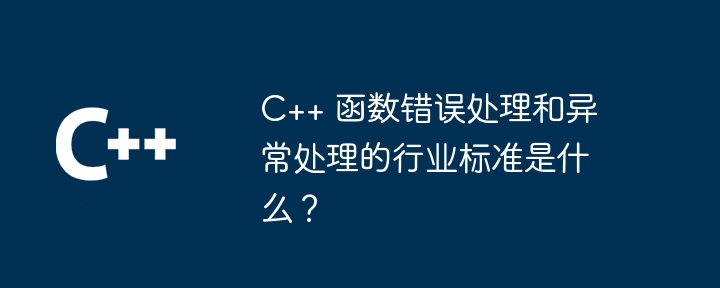
Industry standards dictate the use of the errno variable and exception handling to handle function errors and exceptions. Function error handling: use errno to track errors, perror() to print messages, and strerror() to convert to a string. Exception handling: try-catch catches exceptions, throw triggers exceptions, and the catch clause handles specific types of exceptions.

The industry standard for function error handling and exception handling in C
Handling function errors and exceptions in C is a must in software development Key practices that help create robust and reliable programs. Industry standards establish best practices for these processing mechanisms to ensure code maintainability and robustness.
Function error handling
Exception handling
Practical Case
Consider the following example function, which reads from a file and prints its contents:
#include <iostream>
#include <fstream>
using namespace std;
void readFile(const string& filename) {
ifstream file(filename);
if (file.fail()) {
perror("Error opening file");
return;
}
string line;
while (getline(file, line)) {
cout << line << endl;
}
if (file.bad()) {
throw runtime_error("Error reading file");
}
}Error Processing:
if (file.fail()) to check whether the file cannot be opened. If it cannot be opened, it prints an error message and returns. Exception handling:
getline() loop, the function checks file.bad() to detect any read errors. If an error is detected, it raises a runtime_error exception. try-catch block and take appropriate action: try {
readFile("non-existent-file.txt");
} catch (const runtime_error& e) {
cout << "Error reading file: " << e.what() << endl;
}Best Practice
Follow these best practices for effective function error and exception handling:
errno, abnormal). The above is the detailed content of What is the industry standard for error handling and exception handling in C++ functions?. For more information, please follow other related articles on the PHP Chinese website!
 What are the differences between c++ and c language
What are the differences between c++ and c language
 Recommended learning order for c++ and python
Recommended learning order for c++ and python
 Cost-effectiveness analysis of learning python and c++
Cost-effectiveness analysis of learning python and c++
 Is c language the same as c++?
Is c language the same as c++?
 Which is better to learn first, c language or c++?
Which is better to learn first, c language or c++?
 The difference and connection between c language and c++
The difference and connection between c language and c++
 C++ software Chinese change tutorial
C++ software Chinese change tutorial
 Cost-effectiveness analysis of learning python, java and c++
Cost-effectiveness analysis of learning python, java and c++




